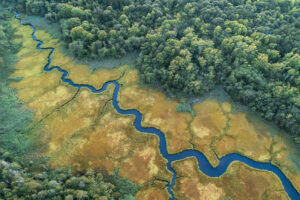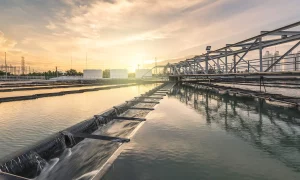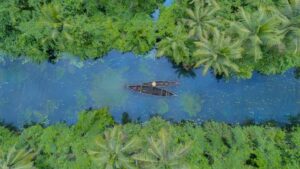2011 Annual Report

Some regard ‘global community’ as an oxymoron, like ‘virtual reality,’ ‘original copy,’ or ‘open secret.’ Community conjures up local groups self-organised around shared priorities. Global evokess even billion strangers competing without a common context. The two words may seem diametrically opposed to each other, except during one week in Sweden’s capital. The Stockholm International Water Institute (SIWI) helps people rediscover how our most extraordinary catalyst unites contradictory words into a focused international congregation. That cohesive force is water.
The World Water Week in Stockholm (WWW) community is diverse in age, kind and origin. We hold 2,677 professional titles, come from 130 different countries, and speak countless native tongues. That is what makes our work and our Week so remarkable. For we are defined by the aquatic resource we share, by our passion for water, by the way we orient ourselves less by passport number or postal code than by catchment and current. And we know – from climate change impacts, from trade in virtual water, from our desire to eradicate poverty – that whatever we do in any one place alters the flow somewhere else. It is water’s profound challenges – and enormous potential – that bind us through this shared matrix into a deliberate, finite, and self-organising group of people.
Water has all too often been either ignored by – or kept in isolation from – the heat of economic reality. As a result, water’s value may get distorted or forgotten. The economics of water management involves understanding its scarcity and its value; ensuring that the costs and benefits of choices are clear and that the impacts of the alternatives are laid out. The challenges are the mirror image of the opportunities. Applying economics to water is challenging, and requires the ability to credibly value market and non-market costs and benefits; to estimate marginal costs and benefits of achieving differing levels of water quantity and quality; to model choices, including risks and uncertainties; and to relate to other disciplines so that there is mutual understanding.
To meet this challenge in 2011, SIWI focused on, and strengthened with staff resources, the emerging competence area of water economics. Our conviction is that the water community must become better at expressing water in economic terms, through the investigation of efficiency, effectiveness, equity, preference and behavioural approaches. So we designed risk based approaches to improve decision-making for climate variability; we developed methodologies to determine the role of water in macro-economic development; and we designed a hydro-economic model to underpin cooperative action in the Euphrates and Tigris region.
The perverse incentives and complications from the economy of water did not vanish in one year. Humanity continued its urban shift; climate change continued its inexorable warming; hundreds of thousands of children continued to die from unsafe water and sanitation. Some began to argue that global water stress, manifest in higher grain prices, may have triggered political changes; others believe domestic uprisings may signal the dawning of thirst-driven conflicts. SIWI believes – and works hard to ensure – that water isand will remain a source of cooperation.
The truth is that water is both “the bloodstream of the planet,” and the foundation of the global economy. Yet this duality utterly confounded the father of economics, Adam Smith. Though a genius of the ages, he was perplexed that we carelessly leaked essential water while carefully hoarding useless diamonds. In this age of global resource scarcity, we are no longer alone in coming to see the worth in water. Rather, we have opened up discussions to make water an appropriate subject for our authentic global community to address all year long.



